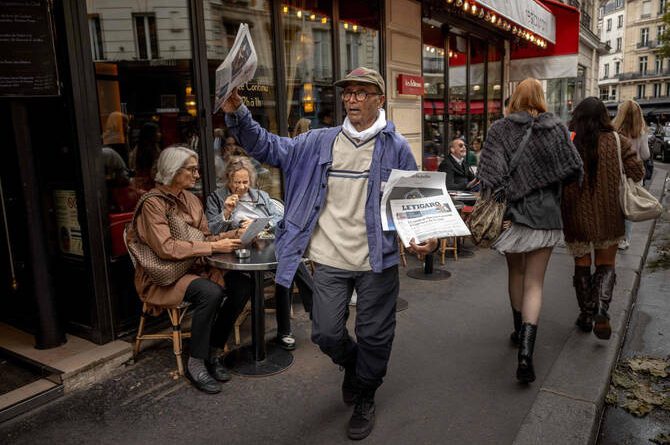Ali Akbar, Paris’ Legendary Newspaper Hawker, Becomes a Living Symbol of Dedication and Joy
Paris’ last newspaper hawker keeps the spirit of the Latin Quarter alive, blending tradition, humor, and community in the heart of the city.
In the heart of Paris’ Latin Quarter, a slim, round-spectacled man zigzags between cafés and bustling streets, newspapers under his arm, bringing laughter and curiosity to everyone he meets. Ali Akbar, 73, has earned a reputation as the last newspaper hawker in the French capital, a living link to the city’s vibrant cultural past.
Every afternoon, Akbar invents humorous headlines to sell his newspapers, turning ordinary street corners into moments of joy. “France is getting better!” he cries. “(Eric) Zemmour has converted to Islam!” he shouts, drawing smiles from passersby who stop to engage with his playful banter.
Ali Akbar’s story is one of courage and perseverance. Born in Pakistan, he arrived in France at the age of 20, seeking to escape poverty and provide for his family back home. He worked as a sailor and a dishwasher before finding his calling as a newspaper hawker in Paris. Through hardships, including homelessness and moments of danger, Akbar has never given up.
His journey into Parisian streets began in the 1970s, when he first started selling newspapers in the university neighborhoods along the Left Bank. It was here, in front of prestigious institutions like Sciences Po, that he learned French, interacted with students, and connected with future French leaders, including former Prime Minister Édouard Philippe.
It was also here that Akbar met Georges Bernier, the famed humorist known as Professeur Choron, who introduced him to the satirical publications Hara-Kiri and Charlie Hebdo. The chance encounter set him on a path that would make him a beloved cultural icon.
“I want people to live happily. I do it to create a good mood, that’s all,” Akbar explains, encapsulating the essence of his work. His invention of playful, sensational headlines in the 1980s made him stand out among Paris’ street vendors. While the city once hosted around 40 newspaper hawkers, Akbar chose to walk, embracing the freedom of the Latin Quarter and making himself a fixture of the area.
Akbar’s dedication has not gone unnoticed. French President Emmanuel Macron has announced plans to make him a knight in the National Order of Merit, recognizing his decades of service and contribution to the cultural life of Paris. “At first I didn’t believe it,” Akbar said with a smile. “I think it’s related to my courage because I’ve worked hard all my life.”
Despite the decline in physical newspaper sales, Akbar continues his routine, working daily from 3 p.m. until 10 p.m., selling copies of Le Monde and sharing laughter with locals and tourists alike. On average, he now sells around 30 newspapers a day, a significant drop from the 150–200 he sold when he started. Yet, his spirit remains unshaken. “As long as I’ve got the energy, I’ll keep going. I’ll work until I die,” he jokes.
For many, Ali Akbar is more than a newspaper hawker. He is a symbol of resilience and human connection in a digital age. Café owners, tourists, and Parisians alike stop to greet him, inspired by his energy and warmth. Amel Ghali, a regular at one of the terraces, said, “It’s good to see it in the digital age. Unfortunately, our children won’t experience the pleasure of reading a newspaper with a coffee. Ali Akbar keeps that tradition alive.”
His legacy is a testament to the enduring charm of Paris’ streets, where culture, humor, and human spirit converge. Even after decades of challenges, Ali Akbar remains a reminder that dedication and joy can create a life of lasting impact, bringing smiles to those who stop and listen to his imaginative headlines.
Ali Akbar, the last newspaper hawker in Paris, continues to embody a rare blend of perseverance, charm, and optimism. His story transcends borders, offering an inspiring glimpse of how one individual can enrich an entire city through simple acts of dedication and humor.



